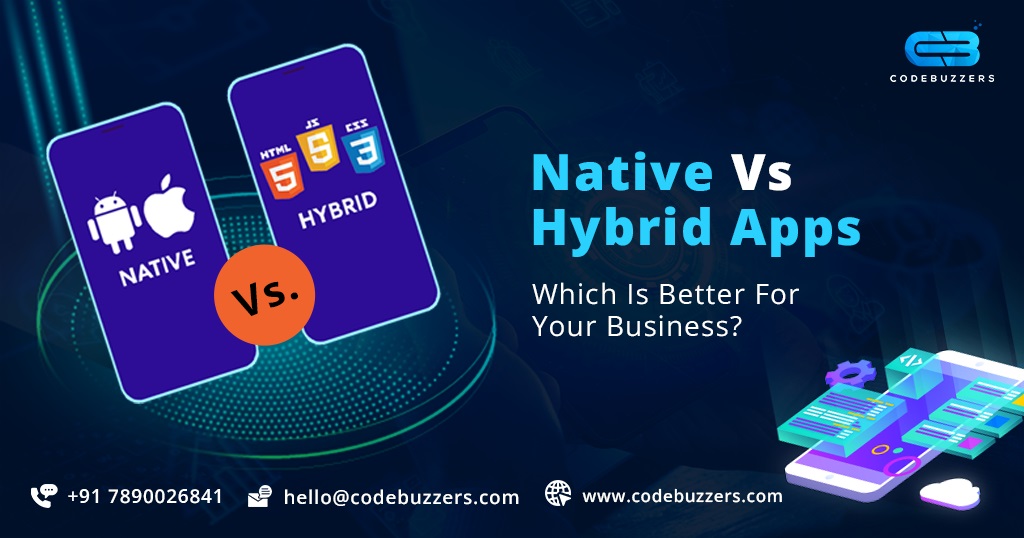Native vs Hybrid Apps: Which is Better for Your Business?
With the growing demand for mobile apps, businesses are seeking the best approach to develop their apps. The two most popular app development approaches are native and hybrid. Both have their pros and cons, and choosing the right approach depends on various factors, such as budget, target audience, and development requirements. In this article, we will discuss the differences between native and hybrid apps, their advantages and disadvantages, and help you choose the right approach for your business.
What are Native Apps?
Native apps are mobile apps developed specifically for a particular platform or operating system, such as iOS or Android, using the native programming languages and development tools. For instance, native iOS apps are developed using Swift or Objective-C, while native Android apps are developed using Java or Kotlin.
Native apps are designed to provide a superior user experience, as they are optimized for the specific platform, hardware, and software. They can access device-specific features, such as camera, GPS, contacts, and notifications, and can operate offline. Native apps can also take advantage of the latest platform updates and integrate with other apps seamlessly.
Pros of Native Apps:
- High Performance: Native apps are faster and more responsive than hybrid apps. This is because they are built specifically for the operating system, allowing for optimal performance.
- Better User Experience: Native apps provide a better user experience as they are designed specifically for the operating system. This means that the user interface is more intuitive and responsive, resulting in a better user experience.
- Better Security: Native apps are more secure than hybrid apps as they are built specifically for the operating system. This means that they are less vulnerable to security threats such as malware and hacking.
Cons of Native Apps:
- High Development Cost: Developing a native app can be expensive as it requires specialized skills and knowledge.
- Longer Development Time: Native apps take longer to develop as they are built from scratch for each operating system.
What are Hybrid Apps?
Hybrid apps, as the name suggests, are a combination of native and web apps. Hybrid apps are developed using web technologies, such as HTML, CSS, and JavaScript, and then wrapped in a native container that allows them to access device features and interact with the operating system.
Hybrid apps can be developed once and deployed across multiple platforms, such as iOS, Android, and web, using a single codebase. Hybrid apps can also be updated easily, as the changes can be made in the web code, which reflects instantly on all platforms.
Pros of Hybrid Apps:
- Lower Development Cost: Developing a hybrid app can be less expensive than developing a native app as it uses web technologies that are more widely available.
- Faster Development Time: Hybrid apps can be developed faster than native apps as they use web technologies that are more familiar to developers.
- Cross-Platform Compatibility: Hybrid apps can run on multiple operating systems, which means that they can be developed once and deployed on multiple platforms.
Cons of Hybrid Apps:
- Performance Issues: Hybrid apps are slower and less responsive than native apps. This is because they are essentially web apps running in a native container.
- Limited Access to Device Features: Hybrid apps have limited access to device features such as the camera and GPS, which can limit their functionality.
- Security Concerns: Hybrid apps are more vulnerable to security threats such as malware and hacking as they use web technologies.
Comparison between Native and Hybrid Apps
Performance and Speed
Native apps have an edge over hybrid apps when it comes to performance and speed, as they are optimized for the specific platform and hardware. Native apps can utilize the full potential of the device, such as GPU, CPU, and memory, to deliver a seamless and responsive user experience.
Hybrid apps, on the other hand, rely on web technologies and a native wrapper, which can impact their performance and speed. Hybrid apps may not provide the same level of responsiveness and fluidity as native apps.
User Experience
Native apps are designed to provide a superior user experience, as they are optimized for the platform and hardware. Native apps can access device-specific features and integrate with other apps seamlessly, providing a smooth and intuitive user experience.
Hybrid apps may not provide the same level of user experience as native apps, as they are limited by the web technologies used to develop them. Hybrid apps may not be able to access device-specific features and may not integrate with other apps as seamlessly as native apps.
Development Cost and Time
Native app development can be expensive and time-consuming, as it requires specialized skills and knowledge of the specific platform and programming languages. Developing separate apps for each platform can also increase the development cost and time.
Hybrid app development, on the other hand, can be more cost-effective and faster, as it uses a single codebase to develop apps across multiple platforms. The development time and cost can be reduced significantly, as the same app can be deployed on iOS, Android, and web platforms.
Maintenance and Updates
Native apps require separate updates for each platform, as they are developed using platform-specific programming languages and development tools. Maintaining and updating multiple apps can be time-consuming and expensive.
Hybrid apps, on the other hand, can be updated easily, as the changes made in the web code reflect instantly on all platforms. Hybrid apps can also be maintained easily, as the same codebase can be used for multiple platforms.
App Store Approval Process
Native apps need to go through a strict approval process to be published on the app store, as they need to meet the specific guidelines and requirements of each platform. The approval process can take several days to weeks, depending on the platform.
Hybrid apps may not require a strict approval process, as they are developed using web technologies. However, the app may still need to meet the basic requirements of the app store, such as security and performance.
Which is Better for Your Business?
When deciding between native and hybrid apps, there are several factors to consider. If you require a high-performance app that provides the best user experience and has access to all the device features, then a native app is the best choice. However, if you have a limited budget and require an app that can run on multiple platforms, then a hybrid app may be the better option.
Ultimately, the decision between native and hybrid apps will depend on your business needs and budget. Consider the pros and cons of each type of app carefully before making a decision.
When to Choose Native App Development
Better Performance
If you want to provide the best possible user experience and performance, native app development is the right approach. Native apps can utilize the full potential of the device, such as GPU, CPU, and memory, to deliver a seamless and responsive user experience.
High Security
If your app deals with sensitive data or requires high security, native app development is the right approach. Native apps can provide better security, as they are developed using platform-specific programming languages and development tools that offer advanced security features.
Advanced Features
If your app requires advanced features, such as augmented reality, machine learning, or advanced animations, native app development is the right approach. Native apps can access the latest platform updates and hardware features, allowing you to provide advanced features to your users.
Targeting Specific Platforms
If your app is intended for a specific platform, such as iOS or Android, native app development is the right approach. Native apps are optimized for the specific platform, providing a superior user experience and performance.
When to Choose Hybrid App Development
Faster Development and Time-to-Market
If you want to develop your app quickly and launch it on multiple platforms hybrid app development is the right approach. Hybrid apps can be developed once and deployed across multiple platforms, such as iOS, Android, and web, using a single codebase.
Reduced Development Cost
If you want to reduce the development cost, hybrid app development is the right approach. Developing separate apps for each platform can be expensive. While hybrid app development can be more cost-effective and faster, as it uses a single codebase to develop apps across multiple platforms.
Cross-Platform Compatibility
If you want your app to run seamlessly on multiple platforms, hybrid app development is the right approach. Hybrid apps can be developed using web technologies, which can run on multiple platforms, providing cross-platform compatibility.
Conclusion
Choosing the right app development approach depends on various factors, such as budget, target audience, and development requirements. Native app development is suitable for providing better performance, high security, advanced features, and targeting specific platforms. While hybrid app development is suitable for faster development and time-to-market, reduced development cost, and cross-platform compatibility.



